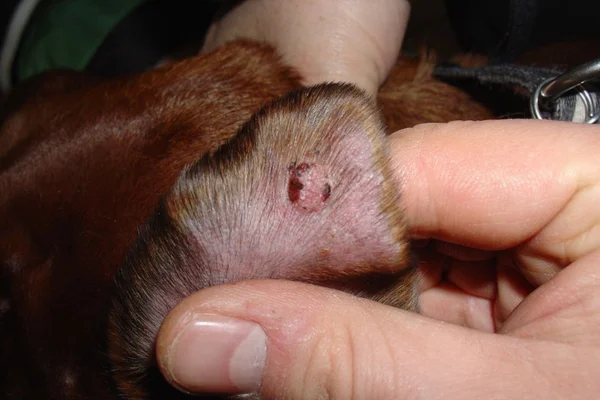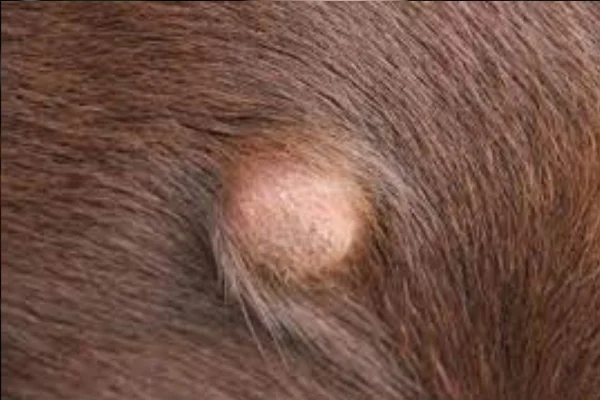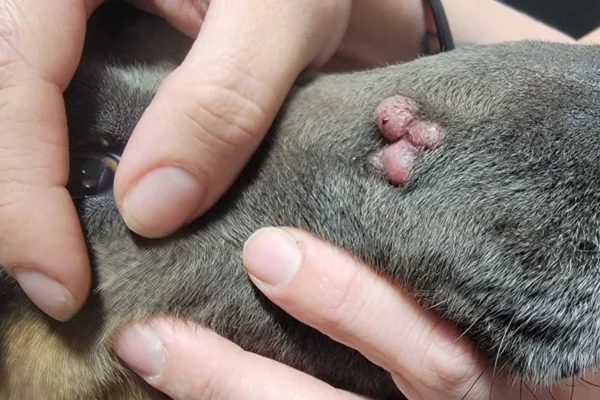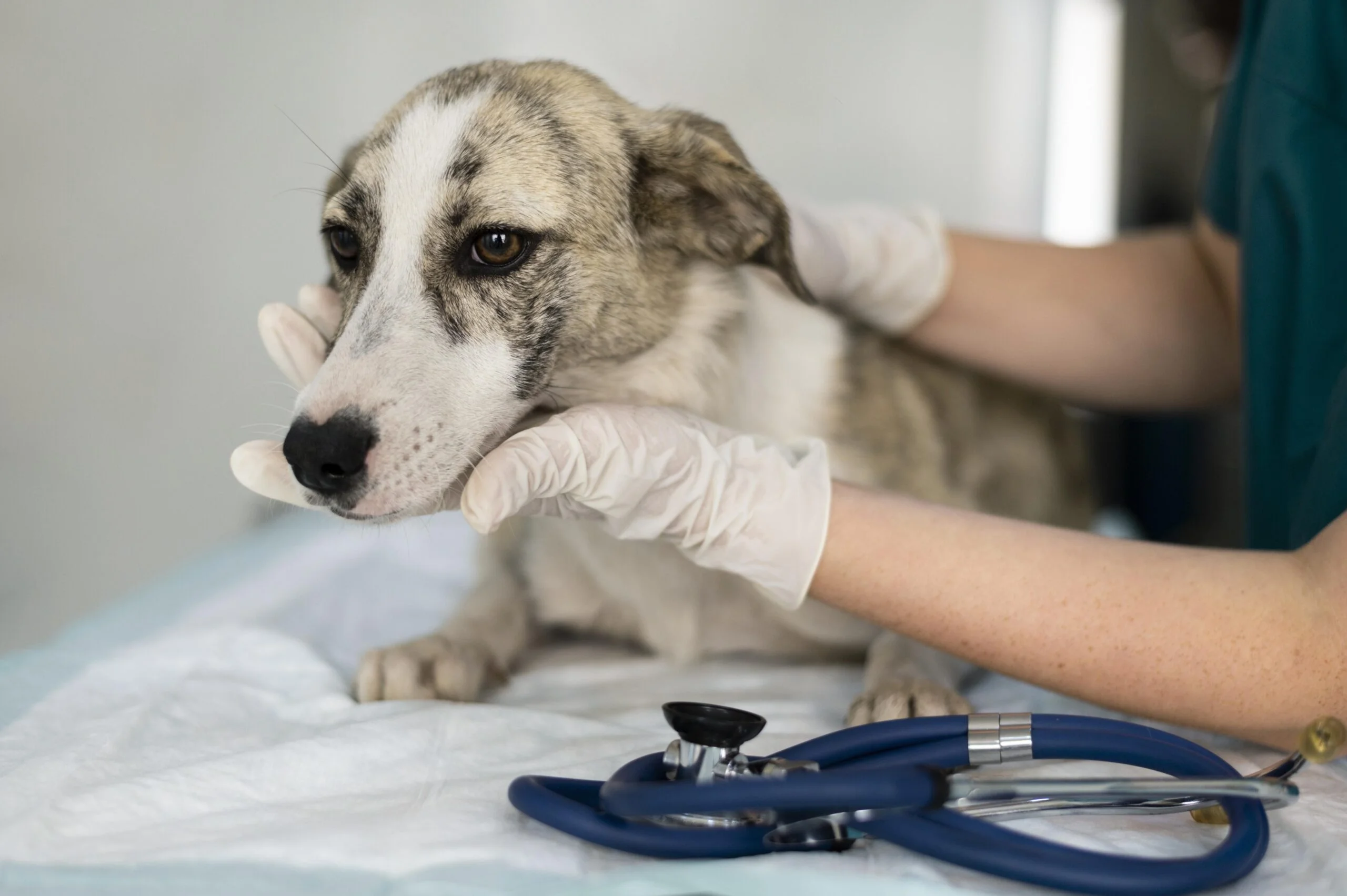Skin Tumors in Dogs
Causes, Treatments and How to Care for Your Furry Friend
Skin tumors in dogs are a common problem that affects our four-legged friends, and it's something that can cause great concern for pet owners. Although the term "tumor" may sound scary, not all tumors are malignant.
With early detection and appropriate treatment, many dogs manage to live long and healthy lives, even after diagnosis. In this article, we'll cover the causes, types, diagnosis and treatment of skin tumors in dogs, always using accessible language to help owners better understand this condition and how they can help their pets.
What is a Skin Tumor in Dogs?
A skin tumor in dogs refers to an abnormal growth of cells on the animal's skin. This growth can be benign (non-cancerous) or malignant (cancerous).
Contents
In other words, not every tumor represents a serious threat to the dog's health, but a veterinary diagnosis is always necessary to determine the type of tumor and the best treatment.
Tumors can manifest themselves in different ways on a dog's skin. They can be nodules, masses, warts or ulcers that don't heal. They can be small or large, hard or soft, and may or may not cause discomfort.
Due to the variety of ways in which tumors present themselves, it is important for owners to be on the lookout for any changes in their pet's skin.

Causes of Skin Tumors in Dogs
The causes of skin tumors in dogs can be diverse and are not always easily identified. Below, we explore some of the main causes:
- Exposure to the sun: Just like humans, dogs can suffer skin damage from prolonged exposure to the sun's ultraviolet (UV) rays. Dogs with fair skin or thin coats are particularly vulnerable to sun damage, which can result in malignant tumors.
- Genetic predisposition: Some dog breeds are more predisposed to developing certain types of tumors. For example, Boxers, Poodles, Labradors and German Shepherds are among the breeds with the highest incidence of skin tumors.
- Advanced age: Older dogs are more susceptible to developing tumors. With aging, the body's cells become more prone to mutations that can lead to abnormal growth, resulting in tumors.
- Environmental factorsChemicals present in the environment, such as pesticides, herbicides and other pollutants, can contribute to the appearance of skin tumors. Exposure to cigarette smoke is also a risk factor.
- Weakened Immune SystemDogs with compromised immune systems, whether due to autoimmune diseases or medical treatments such as chemotherapy, are more likely to develop skin tumors.
- Viral Infections: Certain viruses can cause tumors to develop. For example, the papillomavirus can lead to the formation of warts, which are benign tumors on the skin.
Common Types of Skin Tumors in Dogs
Skin tumors in dogs can be classified into two broad groups: benign and malignant. Here are the most common types in each category:
Benign Tumors
- Lipomas: These are fatty tumors that are generally harmless. They appear as soft masses under the skin and are more common in middle-aged and elderly dogs.
- PapillomasWarts caused by the papillomavirus. They are usually small and benign and can disappear on their own.
- HistiocytomasThese are small, round, fast-growing nodules that usually appear on young dogs. Although they may seem worrying, they usually disappear on their own without the need for treatment.
Malignant Tumors
- MastocytomaOne of the most common malignant tumors in dogs. They can vary greatly in appearance and can release histamine, causing itching and irritation to the surrounding skin.
- MelanomaCommon in dogs with dark skin and coats, melanoma can be benign or malignant. Malignant melanoma is an aggressive form of cancer that requires immediate treatment.
- Squamous Cell CarcinomaThis type of cancer usually occurs in areas of the body exposed to the sun, such as the nose, ears and abdomen. It is a malignant tumor that can be aggressive if not treated early.

Symptoms of Skin Tumors in Dogs
Skin tumors in dogs can present a wide variety of symptoms, not all of which are easily detectable at first glance. Some signs that owners should look out for include:
- Presence of nodules or masses on the skin, with or without rapid growth
- Non-healing wounds or ulcers
- Changes in skin color or texture
- Persistent itching or localized irritation
- Bleeding or discharge from affected areas
- Hair loss around the tumor
If any of these conditions are observed, it is essential to see a vet immediately. Early diagnosis increases the chances of successful treatment and can prevent major complications.
Diagnosis of Skin Tumors in Dogs
Diagnosing a skin tumor in dogs usually involves several steps, starting with a detailed physical examination. During the examination, the veterinarian will check the appearance, size and location of the tumor and make a complete assessment of the dog's general health.
The following diagnostic techniques can be used:
- Fine Needle Aspiration Cytology (FNA)This technique involves taking a small sample of cells from the tumor using a fine needle. The cells are then analyzed under a microscope to determine whether the tumor is benign or malignant.
- BiopsyIn some cases, a biopsy (surgical removal of a sample of the tumor) is necessary for a more precise diagnosis. The sample is sent to a specialized laboratory for analysis.
- Imaging testsTests such as X-rays, ultrasound or CT scans can be used to see if the tumor has spread to other parts of the body.
- Blood testsThese tests can help determine the dog's general state of health and assess the function of organs that may be affected by the presence of malignant tumors.
Treatment of Skin Tumors in Dogs
The treatment of skin tumors in dogs depends on the type of tumor, its location and whether it is benign or malignant. Treatment options include:
Surgery
Surgery is the most common treatment for most skin tumors in dogs, especially if the tumor is small and localized. The vet will remove the tumor and some of the surrounding tissue to ensure that all the tumor cells are eliminated. In the case of malignant tumors, it may be necessary to remove a larger amount of tissue to prevent recurrence.
Chemotherapy
Chemotherapy is mainly used for malignant tumors that have spread or that cannot be completely removed by surgery. This treatment uses drugs to destroy cancer cells, but can also affect healthy cells, which can cause side effects such as vomiting, diarrhea and fatigue.
Radiotherapy
Radiotherapy is an option for tumors that cannot be removed surgically or to complement surgery in cases where there is a risk of recurrence. Radiotherapy uses radiation to destroy tumor cells and stop the tumor from growing.
Target therapy
A relatively new therapy, targeted therapy involves the use of drugs that attack specific tumor cells without damaging healthy cells. This approach is less invasive and has fewer side effects, but is not yet available for all types of tumors.
Prevention and care
Although not all skin tumors can be prevented, some measures can help reduce the risk:
- Sun protectionLimiting sun exposure, especially in dogs with fair skin, can help prevent tumors caused by sun damage. Using dog-specific sunscreen on exposed areas is also good practice.
- Regular ExamsRegular health checks with the vet are essential to detect any abnormalities early. In addition, routinely examining your dog's skin at home can help identify nodules or masses before they become a bigger problem.
- Maintaining a Healthy EnvironmentAvoiding the use of harmful chemicals in the environment where the dog lives, such as pesticides, herbicides and toxic cleaning products, can reduce the risk of exposure to carcinogens.
- Balanced nutrition: A diet rich in nutrients is essential to keep your dog's immune system healthy and able to fight off diseases, including cancer.
Conclusion
Skin tumors in dogs, although worrying, do not always represent a serious sentence. With attention, early diagnosis and appropriate treatment, many dogs can go on to live happy and healthy lives
. The key is constant care and veterinary follow-up, ensuring that any changes to your furry friend's skin are treated promptly. If you notice any changes in your dog, don't hesitate to seek professional help. After all, your dog trusts you to protect him and keep him healthy, and with the right knowledge, you can make a difference to his life.
Thank you for visiting us and check out our other work
https://vettopbr.com/cachorros/








